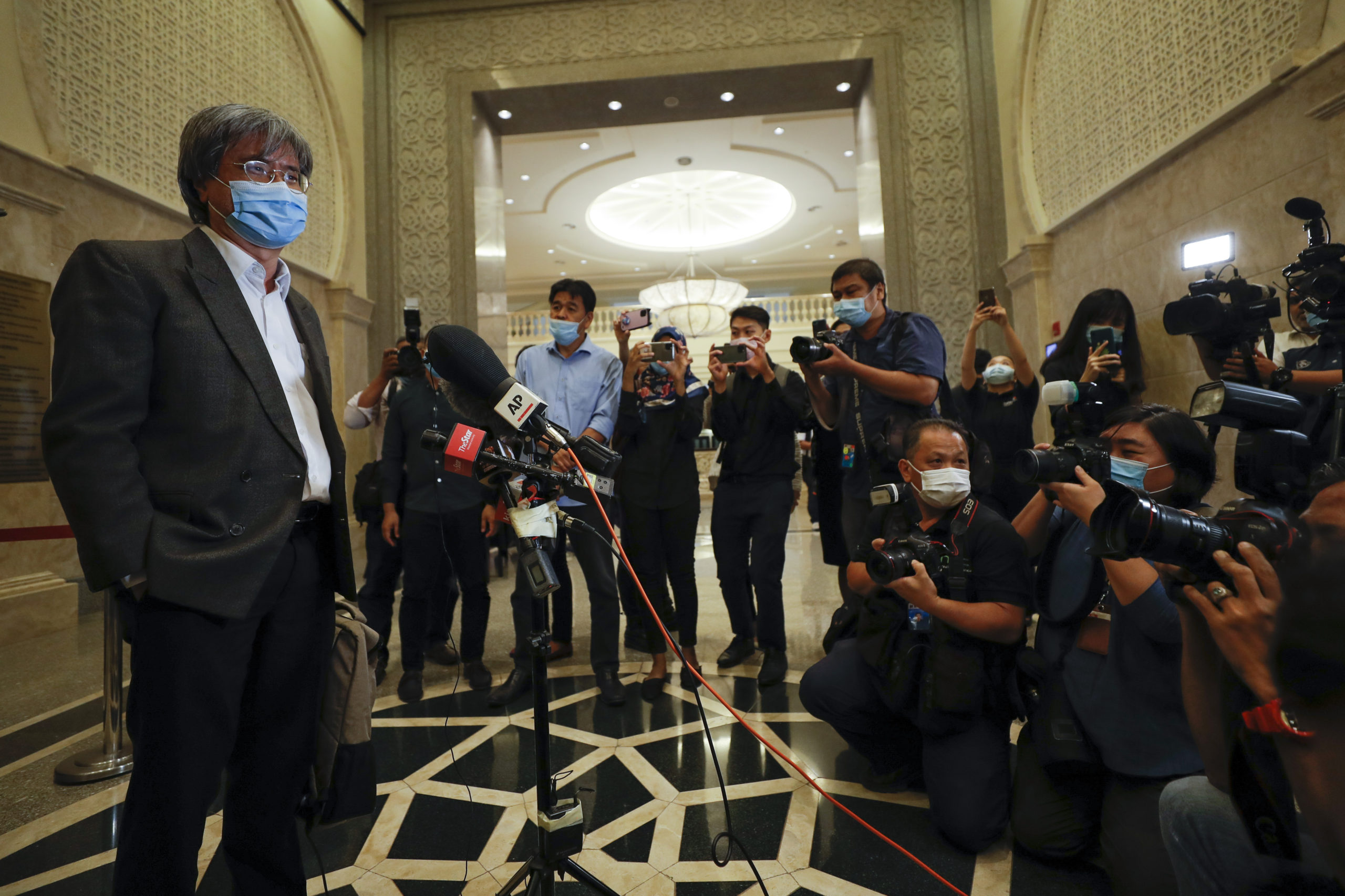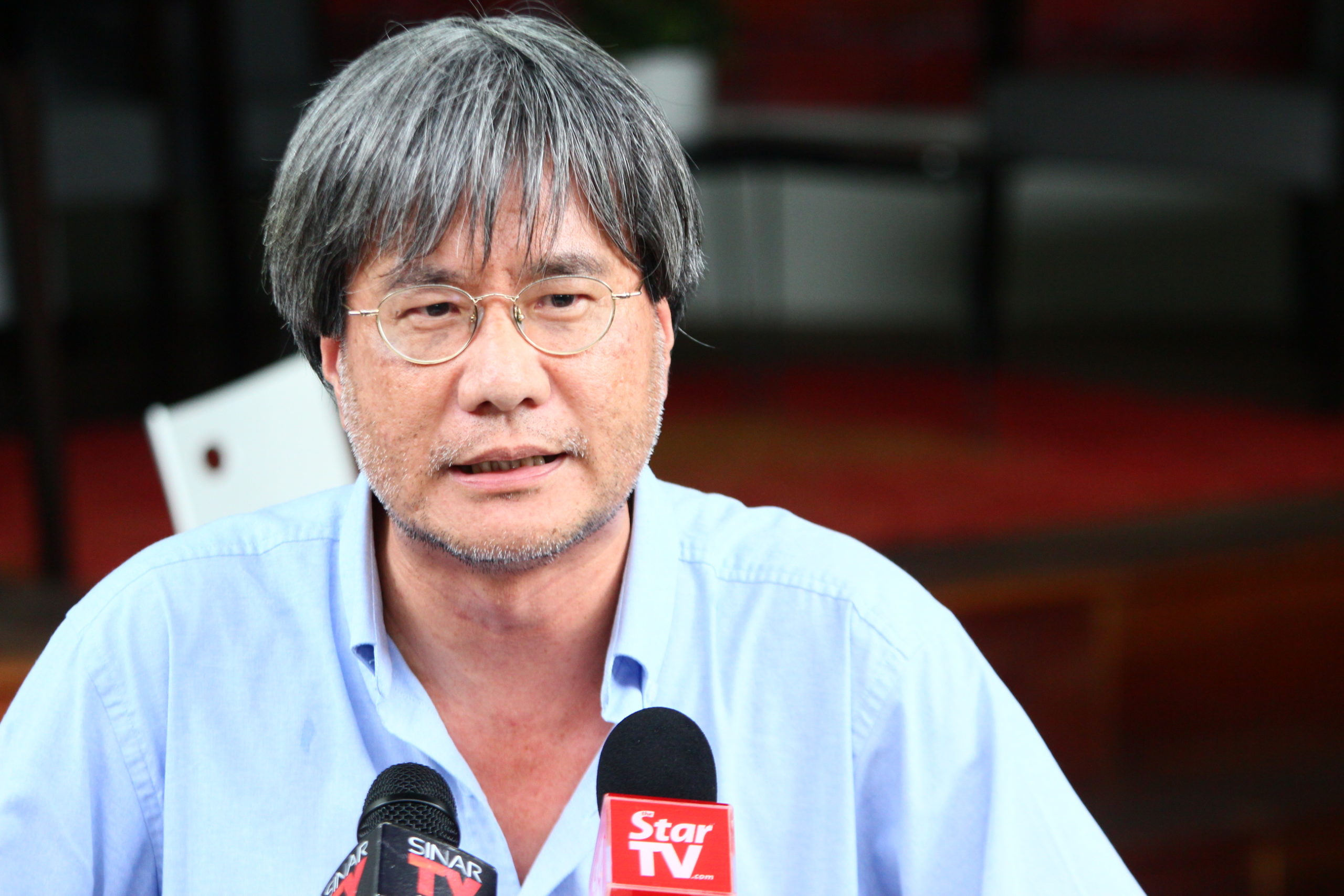
Steven Gan, left, editor-in-chief of Malaysiakini online news portal arrives at court in Putrajaya, Malaysia, July 13, 2020. Attorney General Idrus Harun filed contempt proceedings against Malaysiakini and Gan over comments made by five readers on its portal that allegedly tarnished the judiciary
Enemies of press freedom come in all shapes and sizes. Some are in military uniforms. Others in business suits. A few are in religious garb. And there are those in fancy robes too.
And while restrictive laws are the main focus in our fight for press freedom, there are also innocuous forms of control — through ownership of media organizations and cutting off advertising that many media rely on, among others.
Take Apple Daily in Hong Kong. Its publisher, editors, and journalists were arrested last year. But what dealt the death blow to the newspaper was the freezing of its bank accounts. That effectively forced the company to pull the plug as it could not pay the salaries of its journalists.
Another insidious way of eroding press freedom is through the courts. Over the years, Malaysiakini has faced numerous legal actions — plus in-your-face harassment — in an attempt to punish us, if not shut us down completely.
We were the first media organization in Malaysia’s history to be hit with a lawsuit from a sitting prime minister. Najib Razak eventually withdrew the suit after he lost power four years ago.
Currently, we are fighting a lawsuit from Najib’s former deputy, who is also facing dozens of charges in court for corruption. He is seen as a potential prime minister should his Umno party return to power in the upcoming national elections.
We were also slapped with several other lawsuits, most of them from politicians. A few we won, but most we lost. The chances of winning diminish as our cases move up to the higher courts, which have apparently more conservative judges.
Granted, not all judges agree with one another.
Unfortunately, in our case, those judges who believe in fundamental freedoms — freedom of speech, freedom of worship, freedom from want, and freedom from fear — are a minority.
An example is last year’s 6-1 Federal Court decision in Malaysiakini’s contempt of court case where we received a $124,000 fine over comments posted by our readers. But while we were shocked by the hefty fine, we were dumbfounded when we raised the full amount from crowdfunding in four hours, perhaps the fastest crowdfunding exercise in Malaysian history.
READ MORE: Piercing Putin’s Truth Blockade
Five months later, Malaysiakini was again forced by the Federal Court to pay $126,000 to a defunct gold mine company for our reporting on the health concerns of villagers who were worried about the cyanide used by the company. It was a 3-2 split decision.
Judge Harmindar Singh Dhaliwal, in delivering the minority opinion, said in his judgment:
“As a parting rejoinder, it must be said, and this is beyond dispute, that the press and the journalists play a crucial role in reporting matters of public interest and matters of serious public concern.
“In its role as a watchdog for the people, the awareness created by such media reports will by and large lead to greater protection of society as a whole. In carrying out this duty, the press may at times get the facts wrong.
“However, in matters of public interest, so long as the press holds a reasonable belief that the publication is in the public interest or that the publication is a fair, accurate and impartial account of a dispute, the press and journalists are entitled to the protection of the law.”
Only one other judge agreed with Harmindar’s decision while the other three argued that Malaysiakini had violated the rights of the gold mine company.
Four years ago, when the Court of Appeal reversed a High Court decision and ordered Malaysiakini to pay nearly $80,000 in damages to the gold mine, we raised the amount from our supporters in less than two weeks. (It was this decision that Malaysiakini had appealed to the Federal Court — the country’s highest court — which ended in defeat. Malaysiakini was ordered to pay an additional $45,000, resulting in a total fine of about $125,000.)
And as a way to thank our supporters, we held a free premiere screening of the movie The Post.
Starring Tom Hanks and Meryl Streep, the film depicts journalists at The Washington Post who published the infamous Pentagon Papers, a set of classified documents on the involvement of the U.S. government in the Vietnam War. The U.S. government retaliated by filing a suit against the newspaper.
At the tail end of the movie, a Washington Post journalist reported what Justice Hugo Black said in the landmark 6-3 US Supreme Court decision: “The founding fathers gave the free press the protection it must have to fulfill its essential role in our democracy. The press was to serve the governed, not the governors.”
We are not so fortunate here in Malaysia. Given that the majority in all three branches of government — the executive, legislative, and judiciary — believe that the press serves the governors, not the governed, the powerful, not the powerless, it is incumbent on us to defend “the free press.”
Despite the recent judgments against Malaysiakini, we shall continue to report without fear or favor. But we cannot do it alone. We need your help. Yes, you.
Steven Gan is co-founder and editor-in-chief of Malaysiakini.


